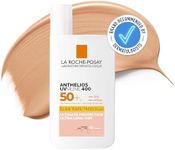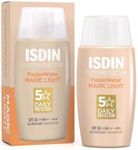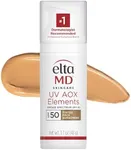Buying Guide for the Best Tinted Sunscreen For Face
Choosing the right tinted sunscreen for your face is essential for both protecting your skin from harmful UV rays and achieving a natural, even complexion. Tinted sunscreens combine the benefits of sun protection with a hint of color, which can help even out skin tone and provide a light coverage. When selecting a tinted sunscreen, it's important to consider several key specifications to ensure you get the best product for your skin type and needs.SPF (Sun Protection Factor)SPF measures how well the sunscreen will protect your skin from UVB rays, which are the main cause of sunburn and can contribute to skin cancer. The higher the SPF, the greater the protection. For daily use, an SPF of 30 is generally recommended, as it blocks about 97% of UVB rays. If you spend a lot of time outdoors or have fair skin, you might want to opt for a higher SPF, such as 50. However, no sunscreen can block 100% of UV rays, so it's important to reapply regularly, especially if you're sweating or swimming.
Tint ShadeThe tint shade is the color of the sunscreen, which can range from light to dark. This is important because it should match or complement your natural skin tone to provide a seamless look. If the shade is too light, it may make your skin look ashy, while a shade that's too dark can look unnatural. Many brands offer a range of shades, so it's a good idea to test a few to find the one that best matches your skin. If you're unsure, opt for a shade that's slightly lighter than your skin tone, as it can blend more easily.
FormulationThe formulation of the tinted sunscreen refers to its texture and ingredients. Common formulations include creams, lotions, gels, and sticks. Creams and lotions are generally more hydrating and suitable for dry or normal skin types. Gels and sticks are often lighter and better for oily or acne-prone skin. Additionally, look for formulations that are non-comedogenic (won't clog pores) and hypoallergenic if you have sensitive skin. Ingredients like hyaluronic acid, antioxidants, and vitamins can provide added skincare benefits.
Broad-Spectrum ProtectionBroad-spectrum protection means the sunscreen protects against both UVA and UVB rays. UVA rays can prematurely age your skin, causing wrinkles and age spots, while UVB rays can burn your skin. Both types of rays can contribute to skin cancer. It's important to choose a tinted sunscreen that offers broad-spectrum protection to ensure comprehensive coverage. This is usually indicated on the product label.
Water ResistanceWater resistance indicates how well the sunscreen stays on your skin when you are sweating or swimming. This is important if you plan to be active outdoors. Water-resistant sunscreens are typically labeled as effective for either 40 or 80 minutes of activity. If you will be swimming or sweating a lot, choose a product with the higher water resistance. Remember to reapply after the indicated time or after towel drying.
FinishThe finish of the tinted sunscreen refers to how it looks and feels on your skin after application. Common finishes include matte, dewy, and natural. A matte finish is ideal for oily skin as it helps control shine. A dewy finish can give a radiant, glowing look, which is great for dry or dull skin. A natural finish is somewhere in between and works well for most skin types. Consider your skin type and the look you prefer when choosing the finish.

















